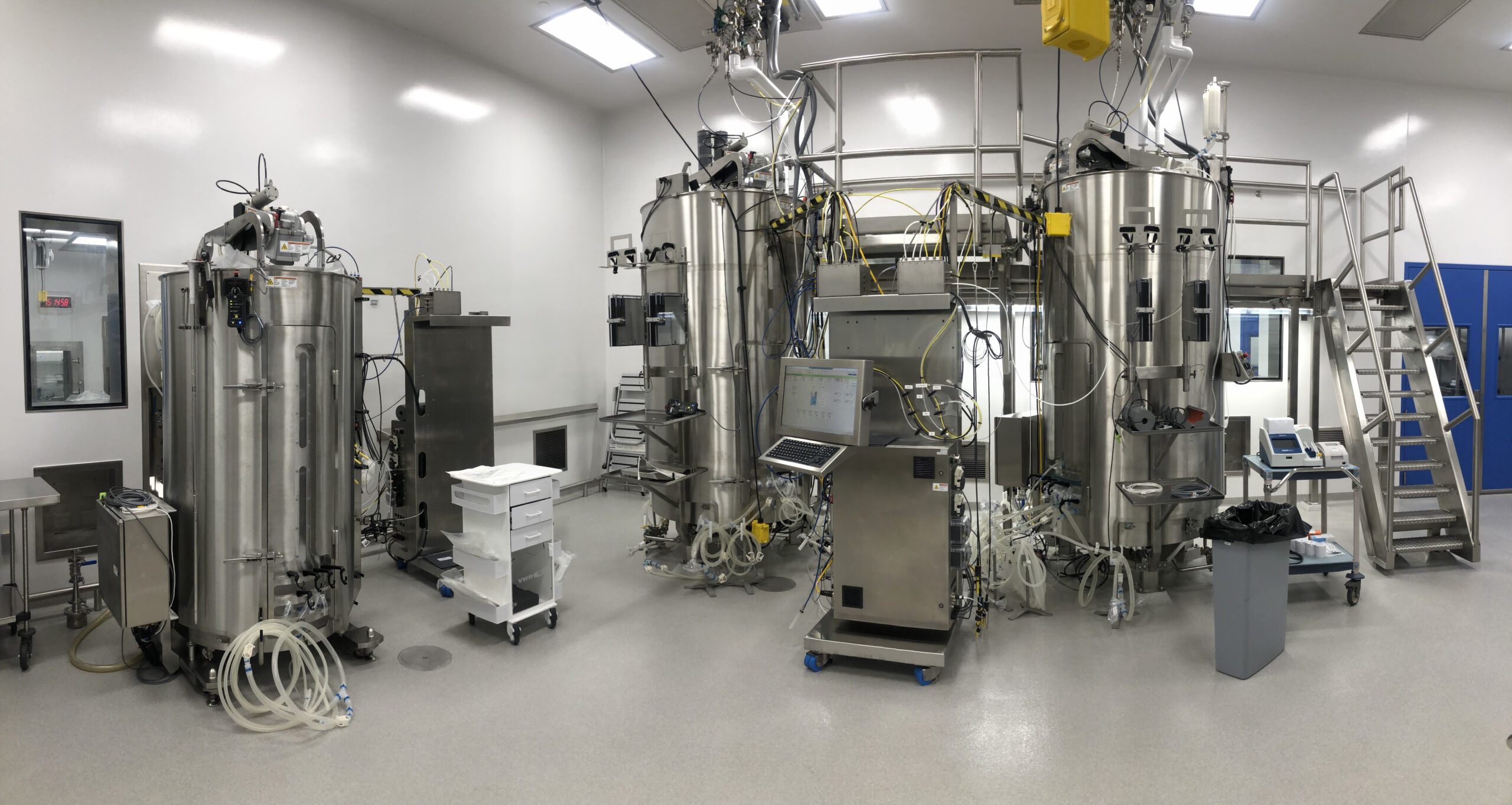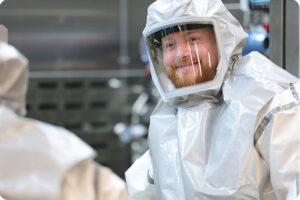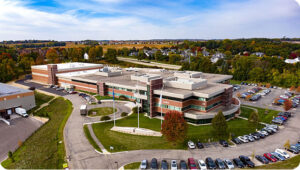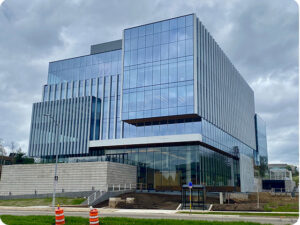
At Catalent’s Madison location, the company manufactures biologically active pharmaceutical ingredients in its small- and large-scale bioreactors, serving pharmaceutical companies of all sizes.
A biohealth hidden gem
For decades, Wisconsin has quietly been an expanding force within the pharmaceutical industry. Now, with the recent announcement that Eli Lilly and Co. will take over a new pharma manufacturing plant, Wisconsin’s star may shine even more brightly.
For decades, Wisconsin companies have been manufacturing the active pharmaceutical ingredients (APIs) that power many kinds of medications sold and used around the world. The trend has escalated in recent years as science and technology have advanced new ways to treat illnesses.
“The biopharmaceutical sector is a critical piece of Wisconsin’s biohealth industry and has contributed to the overall industry’s impressive 11% growth from 2018 to 2021,” says Michael Harrison, senior director of strategic initiatives and community engagement for BioForward Wisconsin, the organization that represents and advocates for the state’s biohealth community.

Aaron Olver, Managing Director, University Research Park
Biopharma provided more than 17,500 jobs in Wisconsin in 2021, and the specialized subsector of biologics manufacturing alone has added nearly 600 jobs since 2015, an increase of 29%, according to BioForward.
Aaron Olver, managing director of University Research Park (URP) in Madison, says biopharma encompasses more than just drug development: “Quite a few of our companies have some sort of biomanufacturing component, even if people don’t think of them that way.”
For example, Exact Sciences makes cancer diagnostics, with its Cologuard kit to detect colon cancer and other products in the works. Illumina makes enzymes that support its genomic sequencing equipment, while Promega makes specialty reagents and kits for life science research. Meanwhile, Fujifilm Cellular Dynamics, founded by pioneering UW researcher James Thomson in 2007, manufactures induced pluripotent stem cells—cell lines reprogrammed from adult tissues—used for research and for treating a wide variety of diseases.
Other companies make pharmaceutical ingredients and are working on novel products. Arrowhead Pharmaceuticals is developing drugs of its own using RNAi technology that suppresses genes linked to various illnesses. The company’s goal, proclaimed on its website, is to have as many as 20 drugs in clinical trials or on the market in 2025. Invenra is partnering with a host of companies to develop cancer-fighting drugs based on Invenra’s platform that allows antibodies to attach to two targets that alert the immune system to attack cancer cells.
A hub that draws companies from surrounding states
One of the new arrivals in Wisconsin was Nexus Pharmaceuticals, which opened its $100 million, 84,000-square-foot facility in Pleasant Prairie in July 2021. Nexus, a family-owned business founded in 2003 and based in Lincolnshire, Illinois, makes generic injectable drugs used primarily in hospitals for chemotherapy, cardiology, and critical care. The plant is fully automated, with a system that loads, sterilizes, fills, and finishes products; it has 84 employees.
Chief Operating Officer Omair Ahmed says Wisconsin officials were “very open and welcoming” to Nexus’s new injectables plant. “Wisconsin is much more manufacturing-focused,” he said, citing technical support, skilled construction workers, and collaboration with Gateway Technical College to train employees.
Eli Lilly announced in April 2024 that it is buying the manufacturing facility from Nexus and will manufacture its own products there, possibly by the end of 2025.
Wendy Harris, regional innovation officer of the Wisconsin Biohealth Tech Hub, calls the decision by Eli Lilly to purchase the plant an exciting move for the state’s biohealth industry. “This commitment adds to our Wisconsin Biohealth Tech Hub goals to advance personalized medicine in the state and to continue to grow throughout the state. The Wisconsin Biohealth Tech Hub and consortium of 18 companies is committed to achieve our goals to grow Wisconsin’s biohealth industry by $9 billion and create 30,000 new jobs in the state within 10 years,” Harris says.
Key players in the sector
These four are just a handful of the other notable companies in Wisconsin’s biopharmaceutical manufacturing sector.

Millipore-Sigma makes the key ingredient for a variety of cancer-fighting drugs.
MilliporeSigma makes the key ingredient for a variety of cancer-fighting drugs. Part of Germany-based Merck Group, MilliporeSigma is a contract manufacturer, which means it supplies products to a host of pharmaceutical companies. The company’s three locations in URP and a $69 million plant that opened in Verona in 2022 specialize in antibody drug conjugates, a class of targeted therapy drugs that zero in on cancer cells and avoid harming healthy cells.
To date, the Madison/Verona sites have produced and shepherded 26 APIs to commercial use, says Dave Goeddel, head of process and analytical development with MilliporeSigma Life Science Services. “We design the way to synthesize the API and manufacture it in a phase-appropriate manner through clinical development. After regulatory approval, we commercially manufacture the drug substance and the company markets the product,” Goeddel says.
MilliporeSigma has about 375 employees in Verona and Madison and several hundred more at research and testing sites in Milwaukee and Sheboygan Falls. The company’s Madison roots go back to Tetrionics, established in 1989 to produce forms of Vitamin D for use in drugs developed by University of Wisconsin-Madison researchers and others.

Catalent Biologics Madison facility
Catalent Biologics is a global company with headquarters in New Jersey. Its Madison plant has roots as a UW-Madison spinoff. Today, Catalent has hundreds of employees at the 305,000-square-foot Madison facility, which offers contract pharmaceutical development and manufacturing for a wide variety of pharmaceutical companies, including advanced biologic therapies used to treat cancer, diabetes, and a range of rare diseases.
“In Madison, we partner with all kinds of clients, both big and small. Early-stage clients can come to Catalent and tell us their scientific findings and disease target, and we help them develop and manufacture therapeutics with the quality needed to launch their first clinical trial. Later-stage clients bring us their existing processes, and we help them expand manufacturing so that they can deliver timely treatments to patients worldwide,” says Justin Koepsel, Catalent’s senior director of commercial operations. “At any given time, we are managing about 60 different therapies in various stages of development.”
Sterling Pharma Solutions in Germantown has about 240 employees and helps companies worldwide develop and manufacture chemically derived small-molecule APIs. Since 2004, the company has supported 30 commercial products and hundreds in clinical development, says Adam Kujath, vice president and general manager. “We work with seven of the 10 largest pharmaceutical companies,” he says.
The suburban Milwaukee plant dates back to 2004 and was acquired by UK-based Sterling Pharma in 2020. “Sterling is highly invested in the site here,” Kujath says. Nearly $20 million worth of upgrades have been completed since the acquisition and the company estimates that another $40 million to $80 million in capital expenditures could follow over the next five to six years. The plant plans to add more than 40 additional employees over the next year and a half.
Labcorp’s site in Madison doesn’t manufacture pharmaceutical products but as a global diagnostic and biopharmaceutical research laboratory, it conducts studies that are required for drug development and approval. “When biotech and pharma companies have a new product they would like to develop into a marketed drug, they come to us. We have the expertise to guide them through the drug development process and conduct the nonclinical pharmacology and safety tests they will need to get their product into clinical trials and beyond,” says Lori Aschenbrenner, director of drug development and regulatory strategy.
Labcorp works with companies around the globe that are working on drugs designed to treat a wide variety of illnesses including cancers and metabolic, respiratory, and infectious diseases. Labcorp supports the companies from discovery all the way through to commercialization. “About 50% of our early development biopharmaceutical business is with small biotech companies. We do see a lot of groundbreaking treatments that start in our testing labs make their way to the market. Often, the smaller biotechs take earlier risks and aim to produce high-impact medicines, so it’s very exciting to work with them,” Aschenbrenner says.
Laboratory Corporation of America Holdings, of North Carolina, purchased New Jersey-based Covance about 10 years ago and has about 1,200 employees in Madison. The site has been helping customers advance new drugs in Madison for decades.
Reaching critical mass
As evidenced by Eli Lilly’s impending presence in the Kenosha area, Wisconsin is a growing center for biopharmaceutical manufacturing—in the Madison area and beyond.
“I’m super bullish” about prospects for biopharma in Madison, says URP’s Olver. The research park sponsors Forward BIOLABS, which offers shared laboratory space similar to office coworking sites. It gives young companies a place to get started without having to invest hundreds of thousands of dollars on equipment. About 15 startups use the labs at any time, and more than 40 have outgrown the space since it was established five years ago.

University Research Park opened a new building, Element Labs, in fall 2023 to create more lab inventory, and it is almost fully occupied now.
URP opened a new, speculative building, Element Labs, in fall 2023 to create more lab inventory, and it is almost fully occupied now. Invenra took over two floors and the UW reserved a block of labs for researchers. “We do see biomanufacturing as a big growth need” which will expand into a second research park, at a site on Madison’s far west side, Olver says.
The increasing demand for products to be made in the U.S. rather than overseas is fueling growth, says Sterling Pharma’s Kujath. Wisconsin’s strong biotech infrastructure and the advantages of living in the Midwest—over the pricey, congested coastal hubs—are additional attractions, he says.
Nexus’s Ahmed says biopharma’s reach has expanded beyond the Madison area. “For a few decades, Madison has been a big biopharma hub, with academic research and early-stage biotech startups. Now, we are looking at the next phase, with more commercial manufacturing plants opening and expanding. I think we’ll continue to see that growth, and I think Wisconsin is poised to take advantage of that,” he says. “Wisconsin could be the next frontier for pharmaceutical manufacturing.”
